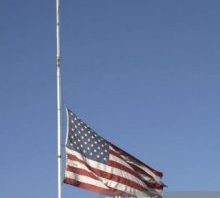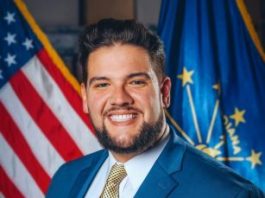By Erica IrishÂ
TheStatehouseFile.com
INDIANAPOLIS—Gov. Eric Holcomb and other state leaders gathered Monday to update the public on the growing COVID-19 pandemic, which has now sickened 4,944 and killed 139 across the state as it approaches an expected peak in the outbreak.
Eleven of those people died in a single nursing home in Madison County, Indiana State Health Commissioner Dr. Kristina Box revealed at the virtual press briefing. Three employees at the facility, Bethany Point nursing home, tested positive for the virus, two of whom are now hospitalized in critical condition.

“This is a heartbreaking situation and illustrates what a brutal toll COVID-19 can take on our most vulnerable populations,†Box said. “Unfortunately, this will not be the last outbreak of this kind.â€
In the first day of a second week of daily, virtual press briefings, Holcomb clarified a new executive order that will expand Indiana’s stay at home order until April 20 and that will impose new restrictions on both essential and non-essential businesses — a primary part of the state’s efforts to prevent the virus from wreaking havoc on vulnerable areas like the nursing home Box described.
“We understand that converting your business model is hard,†Holcomb said. “But it’s hard to give the daily reports, and it’s hard to realize what’s in store for us over the next few weeks. So, drastic times call for drastic measures. We’re all in this together.â€
Holcomb’s latest executive order will take effect at 11:59 p.m. Tuesday and require that essential retail businesses like grocery stores, pharmacies and more comply with social distancing guidelines from the federal Centers for Disease Control and Prevention. This includes maintaining at least six feet between store employees and customers and limiting the number of patrons in a business at any given time.

Non-essential retail businesses — florists and bookstores are two examples provided by Holcomb’s team — may remain open but must use alternative services like delivery or curbside pick-up. Campgrounds will also close to recreational camping, though state parks will remain open for those who wish to use them for exercise.
Box said personal protective equipment, or PPE, remains a primary concern for healthcare workers across the country, and Indiana is no exception as it prepares for a surge in cases expected later this month.
While Indiana made requests to and received assistance from the national strategic stockpile of medical supplies available to states in the event of emergencies like the COVID-19 pandemic, Box said the state “cannot promise we can replenish anyone’s PPE†under the current circumstances.
“As a healthcare provider, that is incredibly hard for me to say,†Box said. “And I know that as a healthcare provider and a first responder that’s even harder to hear. But that’s the reality that every state across the United States is facing at this time.â€
Box noted that hospitals are still reporting some access to their regular supply chains, though some networks have seen a slow in deliveries. State health officials are closely monitoring equipment being used in intensive care units, too. Between March 1 and April 4, the state managed to increase the number of ventilators available by 124%, with 2,639 ventilators available today. The state is monitoring an additional 455 for potential use.
Similarly, about 58% of the state’s available intensive care unit, or ICU, beds are being occupied by patients. Around 31% of those beds are serving COVID-19 cases.
COVID-19 testing is also expanding across the state, Box said, with a renewed focus on pregnant women who may show symptoms of the virus as well as on those with a high body mass index, or BMI. Box said those with a BMI of 30 or higher — those considered obese — need to be tested because such individuals may have diabetes or other health conditions that could make COVID-19 symptoms life threatening.
The economic toll of the virus is also evident, as the Indiana Department of Workforce Development works to accommodate for a historic jump in unemployment claims. The department is also implementing new federal protections for independent contractors and the self-employed, who are typically not covered by the state’s unemployment laws.
Additionally, state leaders said in Monday’s press briefing that Indiana’s revenues fell about $70 million short of their forecast in March. Although the state remains ahead of its forecast for the year-to-date, revenues are expected to continue to fall in the April report, which will reflect the events of March, the month COVID-19 introduced the first of many significant changes to Indiana.
Making reference to Palm Sunday displays that appeared this weekend as many religious celebrations and family gatherings that would normally take place across Indiana were cancelled, Holcomb said Hoosiers will see “peace and victory†when the virus comes to an end.
“Those palm branches symbolized peace and victory as Jesus entered Jerusalem and those palm branches were thrown at his feet,†Holcomb said. “And we will see victory. We will see peace when we too complete our journey through this over the next few weeks, few months.â€
Erica Irish is a reporter for TheStatehouseFile.com, a news website powered by Franklin College journalism students.Â



